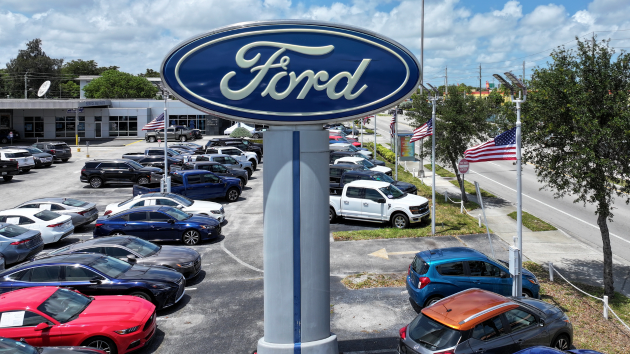
(NEW YORK) — Car buyers may face elevated prices and a shortage of some vehicles due to a supply chain snarled by tariffs and challenges accessing crucial materials, some industry experts told ABC News.
A shortage of aluminum halted production at plants operated by Jeep and Ford earlier this month, pausing the output of some Jeep SUVs and Ford trucks, the Wall Street Journal reported. Meanwhile, a trade spat between the U.S. and China has raised questions about the availability of semiconductors, a critical part at the center of a pandemic-era supply shock.
Those disruptions follow far-reaching U.S. tariffs that have hit foreign automakers and added complications for domestic companies long-intertwined with manufacturers in Canada and Mexico.
The headwinds swirling in the auto industry could make it more difficult for consumers to find their desired vehicle at an affordable price, but carmakers may opt to absorb potential added costs and ease pain for buyers, some experts said. For now, they noted, uncertainty about the level of supply disruption leaves the outcome unclear.
“You start to roll all of this together and it does get significant,” Peter Morici, a professor emeritus at the University of Maryland’s School of Business, told ABC News. “My feeling is that there just have been too many disruptions for this not to affect the availability of automobiles if this goes on long enough. This question is whether it will.”
Stellantis, the parent company of Jeep, declined ABC News’ request for comment. Ford did not respond to the request.
Steep tariffs of 25% on vehicles imported into the U.S. went into effect in April, hiking costs for foreign-made cars, SUVs, minivans, cargo vans and light trucks. Within hours of the policy rollout, Ferrari said it would raise prices by as much as 10% for some models to compensate for the tariffs.
Widespread tariff-driven price increases have never materialized, however.
The policy largely exempted vehicles covered by a free trade agreement between the U.S. and Canada known as the United States-Mexico-Canada Agreement. For such cars, the tariffs only apply to the value of their non-U.S. content, a fraction of the overall cost, the White House said.
Some trade agreements with other nations resulted in lower auto tariffs, including deals with top car exporters Japan and the European Union. Last week, Trump extended a rebate for U.S. automakers meant to cushion the blow of tariff-related costs.
Still, top automakers tallied hundreds of millions of dollars in tariff-related expenses. Those costs risk colliding with concerns over the availability of aluminum and semiconductors, some experts said.
“The fact that it’s all coming at them is a challenge for automakers,” Jessica Caldwell, head of insights at Edmunds, told ABC News, noting the companies had yet to pass along the costs to consumers in the form of higher prices.
“We haven’t seen a lot of impact of tariffs; we haven’t seen a lot of impact of the supply chain. That doesn’t mean we won’t eventually,” Caldwell added.
Earlier this month, China significantly tightened its restrictions on rare earth elements, which make up a key input in semiconductors found in an array of products from cars to home appliances.
The move prompted President Donald Trump to threaten 100% tariffs on all China-made goods next month. Beijing has publicly stood firm on the policy, leaving the two sides at an impasse with massive implications for U.S. automakers.
“The semiconductor is worrisome because it’s in so many things in the car. It’s not just in a body panel but it could be in the seats, the entertainment system — anything basically,” Caldwell said.
To be sure, the ultimate consumer impact of supply chain disruption remains uncertain, experts said. Carmakers may continue to absorb tariff-related costs in an effort to maintain price levels and protect their share of the market, they added.
“I see manufacturers absorbing more of the pain in the short term so they don’t lose customers,” Joseph McCabe, president and CEO of advisory firm AutoForecast Solutions, told ABC News.
Even so, the cloudy forecast should nudge some buyers to move forward with a planned purchase instead of holding out for better conditions, Caldwell said.
“It’s probably a good idea to keep your eyes open for deals,” she added. “I wouldn’t hesitate to buy earlier rather than thinking, ‘Maybe in the future it will be a better time to buy.’ I’m not sure it will be.”
Morici, of the University of Maryland, agreed. “If you want to buy a car in the next month, you should do it — if you can get a good deal,” Morici said.
Copyright © 2025, ABC Audio. All rights reserved.




